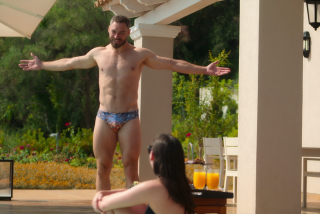VIEWPOINT
- Share via
LONDON — Americans who gripe about endless summer reruns, silly sitcoms, mindless soap operas and Rambo-like cop shows should be very thankful they don’t live in Britain, where television is a four-letter word.
There is this myth that British television is far superior to that on America’s screen, chock full of culture, class and wisdom, but here now is the truth of it: They’d rather you tune out than tune in.
Indeed, British TV executives seem to do everything in their power to make you switch the set off. This makes for outstanding library attendance, but not a very nice night at home in front of the box.
The worst thing about British television is that you have to pay cash for it. It is illegal to simply buy a television, plug it in, raise the antenna and tune in “Miami Vice.”
You must first obtain a license, which costs about $80 a year. If you fail to obtain a license, there is a good chance you will be busted by the truck patrol. TV cop trucks equipped with sensing devices patrol neighborhoods to detect lawbreakers and bust offenders.
Of course, Americans pay for television, too, by having to endure commercials and higher prices at the grocery store. But can you imagine writing a check to NBC just so your children can watch “The A-Team?”
Money raised from the license fee funds the two government-run stations, BBC 1 and BBC 2. There are also two commercial channels, Thames television (channel 3) and another called simply “Channel 4.”
Each channel starts its day at a different time and ends its day at a different time. Switch the set on at noon and you may find nothing but music, with news headlines filling the screen. Some channels do not kick in until 3 p.m. Sign off is about midnight, although some programs run to 1 a.m.
If that’s not confusing enough, some programs take up an entire day on one channel, or begin on one channel and finish on another.
We have Lassie, they have “My Favorite Sheepdog,” or a show that could be called that. For days on end recently, a program about the Scottish National Sheepdog Trials aired on TV, with updates about which sheepdog and which shepherd was leading the pack.
The object was for the sheepdog to chase a herd of sheep around a field until it got them all in a corral. This does not make for exciting TV, unless you are a dog lover and sheep hater.
Another example of weird things one can see on British TV is “Body Talk,” a show about the human body. One recent show was devoted to “the knee” and it came complete with a doctor who parachuted into the audience to demonstrate knee stress and a six-foot model of that particular body part. This was prime-time television.
Also in prime time was a show about the wildlife that inhabits the grounds behind Buckingham Palace.
Sports is a strange beast in Britain. For example, the English will have programs about the art of darts, or cricket or, best of all, snooker.
On a recent night there was sadness on BBC 2. It was the finals of “Pot Black ‘86,” the last edition of the longest-running snooker program on television. Snooker is an odd form of billiards, which like darts, is a national pub pastime in England.
After a shot, the TV snooker player would frequently sit down, light up a cigarette and swig some beer.
No wonder American television dominates the British airwaves. “The Cosby Show,” “Cheers,” “Miami Vice,” “Dynasty,” “The A-Team,” “Kojak,” “Hill Street Blues” and “St. Elsewhere” fill gaps in programming.
But even with American screen aid, there is no rhyme or reason to the programming. “The Cosby Show” might be followed by a documentary about life aboard a cargo ship.
Everything on British television is not awful. Indeed, when the Brits get serious they can give any American network a run for its money in the quality department. “Robin of Sherwood” is an example of one wonderful series. So is “EastEnders,” currently the most popular show on British television.
“EastEnders” is like “Dynasty” except there are no rich people, no designer dresses, no Joan Collins. It is a soap for and about the urban poor, not the suburban rich, and the action is centered around a pub, “The Queen Vic,” and a vegetable stand.
The British outdo us in some arenas, especially when it comes to nudity. They have no compunctions about using naked women in TV commercials, for example, but then maybe British advertisers feel they need to go to extremes to grab the attention of viewers snoring through sheepdog trials.


